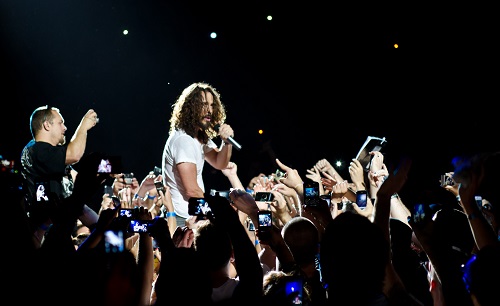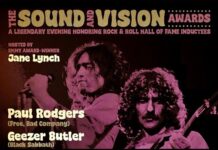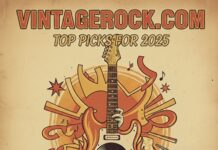By Greg Prato
Throughout rock history, there have been certain times that a specific location spawned a multitude of bands that helped shift the course of popular music. Case in point, San Francisco in the late ‘60s, New York City in the mid ‘70s, and certainly, Seattle in the early ‘90s.
In 2009, I issued the book Grunge Is Dead: The Oral History of Seattle Rock Music, for which quotes were taken from over 100 interviews with members of grunge’s “Big 4” (Nirvana, Soundgarden, Pearl Jam, and Alice in Chains) plus people who were first-hand witnesses to what was going on locally. However, quite a few quotes had to be cut. Now, the strongest leftover quotes comprise the book I ♡ GRUNGE: ‘GRUNGE IS DEAD’ OUTTAKES, which serves as the perfect follow-up read to Grunge Is Dead.
Below are excerpts from a chapter in the book that focuses on when the Northwest region became a focal point in the early ‘90s — in the wake of classic releases from Alice In Chains [Facelift], Nirvana [Nevermind], Soundgarden [Badmotorfinger], and Pearl Jam [Ten].
*
STEVE TURNER [Mudhoney guitarist]: We weren’t aware of what other people were up to, really. Except we knew that Nirvana was gearing up for a new record. We heard that and thought it was great. Soundgarden was doing pretty good already — they were on a slow arc. They were being marketed as a “hard rock band” — kind of from the other side. So, they were doing pretty good anyway by that point. I didn’t feel any great energy in the air or anything like that. We were pretty self-absorbed in our world. We were still pretty busy. Nothing really until Nirvana started climbing up the charts.
SHAWN SMITH [Brad/Satchel singer/pianist]: Alice in Chains had their record out first, in terms of the people around here. There was a sense of “inevitability.” I remember an A&R person telling me, “I don’t know about Alice in Chains — I don’t think they have any ‘songs’.” The old guard didn’t always get what was happening. I got it. You could just feel it. I heard “Teen Spirit” beforehand, and I was like, “That fucker’s going through the roof. That record is going to sell a million records.” I don’t think other people thought that necessarily.
Pearl Jam had a buzz. They did Temple of the Dog, so Pearl Jam was going to blow up. When people from Bellevue — Bellevue’s a suburb of Seattle — come to the shows, it’s all over. It’s spreading. So, out of the gate Pearl Jam was huge in Seattle. I was working at a club at the time. “Teen Spirit” — the single just blew up. Like, the first week it came out, it seemed like it was blowing up. Everything changed, like, “Bam!” Temple of the Dog set it up, Soundgarden set it up, Alice in Chains set it up. So, when Ten and Nevermind came out, it just exploded.
KIM THAYIL [Soundgarden guitarist]: It obviously hit quickly for Nirvana, it hit quick for Alice in Chains…but then again, Alice in Chains didn’t have an indie career. Their first record was on a major label. I don’t think they did any “van tours” — I think they went straight to the bus and major label support. But still, they had their pressures. With us, we thought, “We can handle this” — for a number of reasons. It didn’t grow as fast as Nirvana, Pearl Jam, or Alice in Chains.
We weren’t thrust into this bright light, and we didn’t have all this weight thrown on our shoulders suddenly. And we were a little bit older — we’d been around longer, we made three albums prior to that, we’d been on three different labels, done a number of tours in Europe and the U.S. So, we were a little more seasoned and experienced – we certainly paid our dues more than the other bands. Our band had grown slowly but steadily and continued to grow at that rate – until Superunknown.

PETE DROGE [singer/songwriter]: The kind of cliché is the Greyhound Bus with the Hollywood sign of all the wannabes that wanted to get rich and famous…instead of buying a ticket to Hollywood, they bought a ticket to Seattle.
PETER BAGGE [Illustrator (Hate comic series)]: I wasn’t too impressed with what became the whole “grunge scene.” It didn’t seem new or innovative to me at all – in that both the sound and look of the bands reminded me of what I dressed like and listened to when I was in high school in the early ‘70s.
The way the bands dressed also struck me as anti-style — which I guess was the point, but it seemed awfully lazy to me. Like, if you’re going to get on stage and have people look at you, at least make some kind of effort — rather than look like every other Tom, Dick and Harry walking around the streets. Or more accurately, walking through the woods chopping down trees!
RIKI RACHTMAN [Host of MTV’s Headbanger’s Ball]: The thing is, people have told me before, “Well, grunge killed glam metal.” And I hate when they say that. Because you know what? I listen to rock n’ roll. It doesn’t matter if I’m listening to Black Sabbath or if I’m listening to Black Flag — it’s all rock n’ roll, as far as I’m concerned.
All of a sudden, here came these bands with the tuned down guitars and this kind of chunky sound. It just seemed like when Alice in Chains, Soundgarden and everybody hit, that it was just a different sound. But everybody wants to be like, “Grunge is killing it.” It was funny when all these bands tried to look and sound the same, but it was just another form of rock n’ roll.
I wasn’t the guy who was all negative on it. I always loved Nirvana, I always loved Alice in Chains. I think Chris Cornell is one of the greatest vocalists. But they didn’t kill heavy metal. I mean, Soundgarden is Black Sabbath, as far as I’m concerned. It’s the same kind of stuff. But it did come, and it did hit hard.
The thing is, it was just a bunch of bands, and they just happened to be Seattle. But everybody had to make “a Seattle scene,” and whenever something is hot, then every stupid idiot that works in the record business wants to find the next Nirvana, the next Alice in Chains. And if those bands can’t be it, then all of a sudden, they have to change themselves to be that “next thing.”
I mean, I’ll never forget — I’ve been wearing flannel shirts and Pendleton shirts since I was a little kid. I always have. I still do. And all of a sudden, I’m reading, “Riki Rachtman’s turned ‘grunge’ — he’s got his flannel shirt on.” I’m like, “You’re an idiot. I ride motorcycles — I wear flannel shirts because they’re warm.” All of a sudden, a flannel shirt meant something that wasn’t just a shirt. It was stupid.
MIKE INEZ [Alice in Chains bassist]: There’s just a lot of pressure put on you when there’s that much dough involved and kind of riding on you. “What happened? I’m just this guy that likes to drink beer and play the bass.” Just the amount of gigs they’d book for us, the pressure of these hits records, these huge recording budgets — a lot of pressure to put on some young guys.
JACK ENDINO [Producer/engineer, Skin Yard singer/guitarist]: It became this cultural movement. Really all it was were a bunch of bands that shared a sort of aesthetic. And in retrospect, it’s more just a certain subset of rock that is associated with a certain time and place.
STEVE MANNING [Sub Pop Records publicist]: We were so far off the map before that — that’s what made it cool. People just did whatever. There were definitely good bands — there’s always been good bands here — but it had just lost a lot of its luster for me. I didn’t want to go to a show and be around a bunch of frat guys — and that’s what it was.
I think that’s changed again. I think the scene is much more thriving again, and people are making much more diverse kinds of music than they ever have before. But you can’t replace your experiences from that time in your life. Which for me, I was a little older than most people — I was in my twenties when this was all happening — and you can’t relive those. That happens once for you, no matter what you’re doing. It just never felt the same to me again — and it will never feel the same again.




















